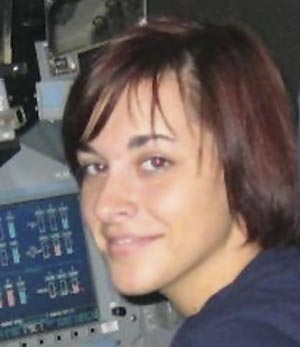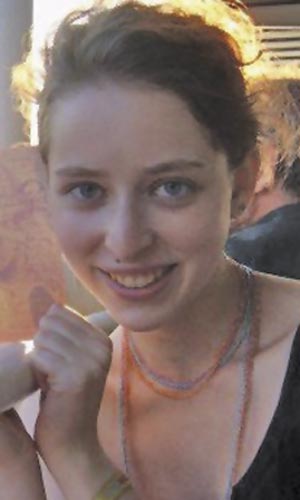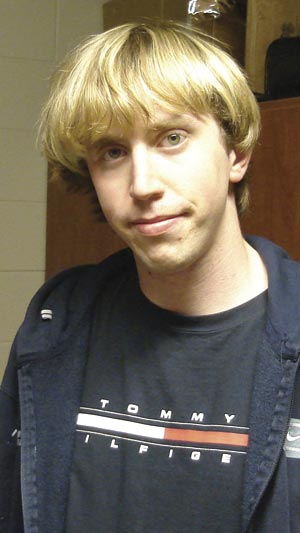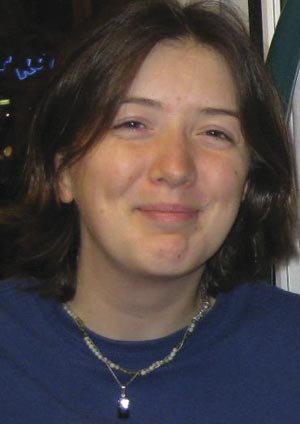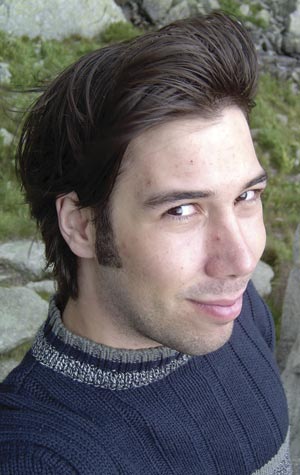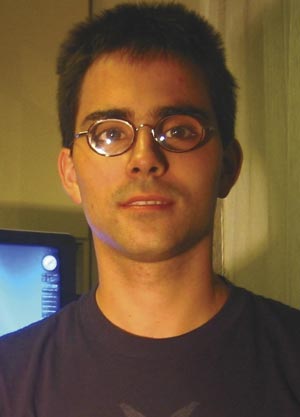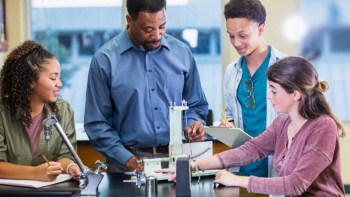As they enter their final year of undergraduate study, six students from around the globe share with Physics World their perspectives on physics, their courses and the future

The final year of university is a time of transitions. After years of lectures and formal laboratory sessions, many physics undergraduates will spend a significant chunk of this period doing real research for the first time, as part of an honours thesis, MSci degree, Diploma or other “capstone” course. Some will apply to do a PhD as a result of this experience. Others will be inspired to seek a career tackling problems in industry, or to share their knowledge with the next generation of physicists, as teachers. Some (as our regular Once A Physicist column proves) will go off in entirely new directions, bringing their skills and mindsets to areas outside the traditional physics strongholds.
Regardless of their decisions, this is the year when career plans start to become reality — and when many students grow thoroughly sick of the question “What will you do next year?”. Physics World joins the legion of well-meaning inquisitors by asking final-year students — from the UK, US and Europe — to reflect on how their courses have gone so far, their plans for the future, and their advice for students who are just starting out.
Astronaut dreams
Name: Jessica Snyder
Course: BS in engineering physics with an aerospace focus and BS in astronomy at the University of Kansas, US
Originally from: Clearwater, Kansas, US
My mother teaches high-school physics, so I was encouraged early on to take physics-oriented classes. I started out at Kansas University doing a purely engineering degree, but the people and atmosphere in the physics department were very inviting, which was part of the reason that I switched courses. The engineering-physics major gave me exposure to both the conceptual background and some practical applications of the principles used to understand and interact with the physical world.
Right now I’m looking at graduate schools with some sort of energy-systems engineering programme. I’ve known since childhood that I wanted to be an astronaut, but in this past year, many of my long-term goals have shifted and my career path has diverged from my childhood dream to a more “practical” direction. I guess that I have made a distinction between my ideal job and my dream job: my ideal job would be as an engineer designing and implementing systems involving renewable-energy technologies; but in my dream job, I’d walk in space.
My advice for first-year students is to make sure that you get started on the right foot. I did not take my freshman year nearly as seriously as I should have. And get involved early! Join clubs and groups to make an impact on your environment.
On course for teaching
Name: Carole Kenrick
Course: BSc in physics at Bristol University, UK
Originally from: London, UK
I decided to study physics because it challenged and fascinated me. The best part has been finally getting my head round some difficult concepts in quantum mechanics. I enjoyed this so much that I am taking a module on the philosophical foundations of physics, which explores topics that physicists usually ignore so that they can focus on calculations. I’ve come to understand far more physics than I ever expected to, and discovered that doing physics is actually quite tricky!
Along the way, I’ve also learned some Spanish, thanks to Bristol University’s policy of allowing first-year students to take modules in other subjects. Given how international the scientific community has become, it might come in handy. If I could give any advice to first-year students, it would be to do as much maths as you possibly can, because it will eventually be useful. My only regret is not being involved in more societies in my first year, although it does take time to settle in.
My dream job is to be an ethical fashion designer who writes and illustrates children’s books about science on the side. My love of working with children is part of the reason that I decided to take up a place with Teach First next year. Teach First is a charity that encourages graduates who might not have otherwise considered teaching to spend at least two years in challenging schools. It will probably be the most demanding experience of my life, but I know it will be worth it.
Robots and research
Name: Scott Watson
Course: BS in physics at College of William & Mary in Williamsburg, Virginia, US
Originally from: Reston, Virginia, US
I enjoy mathematics, and being able to apply mathematical concepts to understand the world around us fascinates me. Plus, as we learn more about how the world works, we can find ways to improve it, which I feel is very important.
My course offered me a wide variety of physics topics to study. I have also had a taste of doing real scientific research when working with one of my lecturers on interpreting sensor data for robotics. My professors are all interesting people, and very fun to get to know and talk to. They also love working with us, and talking to us about what they do.
My advice for students in the early years of their course is to find friends in your subject in order to work on coursework problems together. That way, you can get help from others when you run into trouble or they can explain things that you did not understand in class. Plus, it helps make the work less stressful.
I plan to go on to graduate school to do research in either physics or applied science. Eventually, I’d like to become a professor. I enjoy doing research, as I love the idea of exploring the topics I’m interested in and contributing the knowledge I gain to the community as a whole. I also enjoy working with other people, and being able to explain my work to them.
Super furry physics
Name: Nia Bell
Course: MSci in theoretical physics at Durham University, UK
Originally from: Narberth, Pembrokeshire, UK
I decided to study physics after completing a year in industry, where I worked in a civil-engineering company. I would really recommend a placement year to younger students, as it is a great opportunity to get some quality experience, earn some money and grow up a little before university. There is no real rush to graduate, and I think the year off helped me feel confident in my choice of degree from the beginning. Although I enjoyed my placement, I soon realized that engineering was not for me. I felt that a more hi-tech, cutting-edge field would have greater appeal. The most advanced, groundbreaking form of engineering is, of course, physics.
The best part of my degree so far has been my decision to take a maths workshop suitable for theoretical physicists in my third year instead of the usual laboratory module that most people choose. I found the maths extremely difficult and I struggled with it for the entire year, but I am glad that I chose to take this module because it has given me some useful mathematical tools and, probably more importantly, the confidence to use them.
I did not realize until my third year at university that the concepts we had learned in previous years all had important applications in research and new technologies. This appreciation has reinvigorated my interest in physics and made me seriously consider a career related to it. In the coming year, I plan to produce a thesis of which I can be truly proud. I also intend to make the most of student life. Durham University is a very friendly place with a vast number of extracurricular activities, making it difficult to claim that there is nothing to do here.
As for the future, my dream job would be to play saxophone with the band Super Furry Animals, or to invent something amazing that I could put into production in a factory by the seaside where I grew up in Pembrokeshire. More realistically, I would like to do something I care about and can get excited about for many, many years. I hope to spend next summer in the most exotic place I can afford, but after that I would love to return to physics as a PhD student. I am still undecided about what to specialize in, but I would like to continue my studies abroad. I am also interested in possible industrial positions in which physics could be applicable.
Three paths
Name: Balazs Karcsai
Course: Degree in physics with astrophysics at Eotvos Lorand University, Hungary
Originally from: Budapest, Hungary
When I was a secondary-school student, my physics teacher asked me to give a lecture about particle physics, so I read Leon Lederman’s book The God Particle. My lecture ended up being five hours long, and it inspired me to be a physicist! At university I found out that particle physics is very hard, and so I started my student research in material physics. But when I selected my specialization, I chose astrophysics.
The best part of my course is that I have learned a lot about things beyond just the laws of physics. For example, I have learned how to give talks and write articles, how to simplify problems, and how to convince people. I got involved in my physics student association, organizing scientific and social programmes and finding sponsors to fund the society. I edited the weekly paper of the science faculty, and I have written articles in Hungarian scientific magazines about high-energy astrophysics. These skills and experiences have helped me both in and outside of science. For me, one downside of being a physics student in Hungary is that fewer than 10% of the students in my year are women, but I solved this problem by getting to know people in the humanities departments as well.
When I started my course, I had different conceptions about studying physics. At first, I was sure that I would eventually want to work as a researcher. But now I can see many other interesting possibilities, too. I have three different plans for the next year. The first is an astrophysics PhD somewhere in western Europe, the second is to work for a multinational company and earn some money, and the third is to be a science writer or a journalist.
Ideally, I would get a job where I am always with people and I need to use my brain and be creative. It is important to manage my own time, because I do not like getting up early and I am more effective in the evening. But I know the real world is usually different from dreams.
My advice for first-year students is to learn computer-programming languages as soon as you start your degree. I had many problems with programming when I started research on my thesis. And, have a good social life, go abroad as often as you can and be open to new things.
Calculations and more
Name: Konstantin Ottnad
Course: Diploma in physics at the University of Bonn, Germany
Originally from: Freiburg, Germany
I decided to study physics because I was interested in how things work. I was also good at mathematics in school, so I never had to think much about what to study — it was pretty clear that it would be either maths or physics. In fact, I started studying maths — there was a project at my school that allowed you to attend courses at university during your final three years — but then I decided that physics was more interesting. Now I am working on my final thesis about chiral perturbation theory, a topic in quantum chromodynamics.
In Germany, after the first two years of study, the course is flexible. There is a big selection of lectures and seminars that you can choose from, with very few restrictions. Personally, I did not like most of the lab courses (which are obligatory) because I am more interested in theoretical physics. From my point of view, the lab sessions just created a lot of work without giving me the feeling of learning something I would need later.
The best parts have been the lectures and seminars during my third and fourth years that I chose on my own and that have dealt mainly with theoretical particle physics and quantum field theory. If I could do it over again, though, I would probably try to be a bit more careful about which lectures I attended. That probably could have saved me a semester.
I did one semester abroad at the University of Glasgow in the UK, which was great fun. In addition to going to lots of parties, I also did a Masters project there for about four months. This helped me to decide which field I should pick for my final thesis, and I even won a prize for it, which was nice.
I will be working on my thesis for the next 12 months. After this I am probably going to do a doctorate, which will take at least three more years. Ideally, I would like a job where I could do calculations and programming all day long, and get paid lots of money for doing so.
My advice for new students is simple: as someone once said, shut up and calculate! It really helps in most cases, believe me. I think it is extremely important to work hard right from the beginning of your studies. Otherwise you are likely to lose a lot of time just trying to catch up with the subsequent lectures.
Physics in action
Name: Julie Feldt
Course: BS in astronomy and physics, University of Kansas, US
Originally from: St Louis, Missouri, US
My high school physics teacher sparked my interest in physics. She was a great teacher. She would talk with me about what was going on in physics in the real world and encouraged me to go to lectures at the universities in St Louis. She showed me how cool physics really is.
The best part of my degree has been getting to do a lot of the experiments that we learned about in lectures, like Faraday rotation and the Michelson interferometer. We have measured the speed of light, the temperature of the Sun and the lifetime of muons. It was so much fun to actually see the experiments in action. I have also had really good professors. One major downside has been working with students who do not really care about understanding the subject — they just want to get the answers right and be done with it. Working with those students can be draining.
In my degree, I have taken several field-specific courses like nanotechnology, and next semester I will take space plasma physics and molecular biophysics. After that, I want to go to graduate school to get a Master’s degree in space physics and planetary science. I am not completely sure yet what I would like to do after that, but I would like it to involve research — maybe at a place like the National Oceanic and Atmospheric Administration or the Laboratory for Atmospheric and Space Physics.
I would really encourage students to get involved in research as soon as they know they are interested in the field. Research will tell you more about what things are really like, and then even if some of the classes seem hard they end up feeling more worth it. I have had a lot of research experience through the National Science Foundation’s Research Experience for Undergraduates (REU) programme, as well as undergraduate research courses. So when I have had a class that I was not as excited about, I just concentrated on how much I love working in my field and told myself that this was just one step out of many that I had to get through to reach my goals.
Love life, love physics
Name: Jelmer Renema
Course: MSc in experimental physics, specializing in quantum optics and quantum information, Leiden University, Netherlands
I always knew I was going to study a “hard science,” but I settled on physics only in my last year of high school, partially because the physics teacher that I had then was very enthusiastic about his subject. The strange thing was that he was not a very good teacher — he once had to suspend a lecture because he couldn’t find a sign error when he was deriving the of equation of motion of the simple harmonic oscillator — but his enthusiasm shone through and convinced me that physics was worth spending time on.
The best part of my course so far has been the theoretical course on quantum computing, which introduced a lot of concepts very quickly but has given me a broad grounding in the subject. It also provided a good overview of current research on the subject. I constantly draw on my knowledge from this course at conferences or when listening to colloquia.
I really like the academic atmosphere of openness and accessibility at the Leiden Institute of Physics, and I hope to make a career in academia. Barring that, a job as a science communicator or journalist would be nice.
I would advise first-year students to get involved in many associations, projects, etc. Now is the time of your life when you discover what you’re good at and what you like, and there is no better way to do this than to immerse yourself in as many different activities as possible. After a while, you are going to have to narrow it down a bit and get to work on graduating, but do not worry too much about that when you start.
